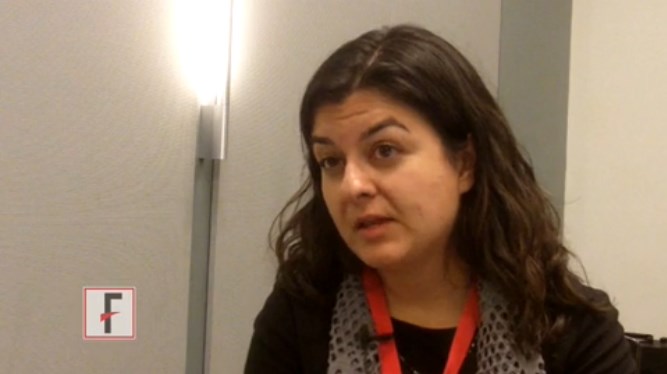User login
NASHVILLE, TENN. – U.S. stroke specialists now face the challenge of making endovascular embolectomy a routinely available option for selected patients with acute ischemic stroke, Dr. Pooja Khatri said in an interview at the International Stroke Conference.
During the conference, which was sponsored by the American Heart Association, new reports from three independent, randomized controlled trials, as well as data from a fourth study published in January, collectively established endovascular embolectomy as the new standard-of-care treatment for acute ischemic stroke patients with a proximal occlusion of a large, intracerebral artery. The stroke community, however, now faces the responsibility of figuring out how to make this a reality.
Among the hurdles they face are using CT imaging or other methods to identify in daily practice the specific patients who will get the biggest benefit from endovascular treatment and finding a consensus within each region on how to triage acute stroke patients to centers that can perform embolectomy, said Dr. Khatri, professor of neurology and director of acute stroke at the University of Cincinnati. In Cincinnati, Dr. Khatri and her colleagues are planning to soon hold a retreat with representatives from other area hospitals to try to work out the logistics.Dr. Khatri has received research support from Penumbra and Genentech.
The video associated with this article is no longer available on this site. Please view all of our videos on the MDedge YouTube channel
[email protected]
On Twitter @mitchelzoler
NASHVILLE, TENN. – U.S. stroke specialists now face the challenge of making endovascular embolectomy a routinely available option for selected patients with acute ischemic stroke, Dr. Pooja Khatri said in an interview at the International Stroke Conference.
During the conference, which was sponsored by the American Heart Association, new reports from three independent, randomized controlled trials, as well as data from a fourth study published in January, collectively established endovascular embolectomy as the new standard-of-care treatment for acute ischemic stroke patients with a proximal occlusion of a large, intracerebral artery. The stroke community, however, now faces the responsibility of figuring out how to make this a reality.
Among the hurdles they face are using CT imaging or other methods to identify in daily practice the specific patients who will get the biggest benefit from endovascular treatment and finding a consensus within each region on how to triage acute stroke patients to centers that can perform embolectomy, said Dr. Khatri, professor of neurology and director of acute stroke at the University of Cincinnati. In Cincinnati, Dr. Khatri and her colleagues are planning to soon hold a retreat with representatives from other area hospitals to try to work out the logistics.Dr. Khatri has received research support from Penumbra and Genentech.
The video associated with this article is no longer available on this site. Please view all of our videos on the MDedge YouTube channel
[email protected]
On Twitter @mitchelzoler
NASHVILLE, TENN. – U.S. stroke specialists now face the challenge of making endovascular embolectomy a routinely available option for selected patients with acute ischemic stroke, Dr. Pooja Khatri said in an interview at the International Stroke Conference.
During the conference, which was sponsored by the American Heart Association, new reports from three independent, randomized controlled trials, as well as data from a fourth study published in January, collectively established endovascular embolectomy as the new standard-of-care treatment for acute ischemic stroke patients with a proximal occlusion of a large, intracerebral artery. The stroke community, however, now faces the responsibility of figuring out how to make this a reality.
Among the hurdles they face are using CT imaging or other methods to identify in daily practice the specific patients who will get the biggest benefit from endovascular treatment and finding a consensus within each region on how to triage acute stroke patients to centers that can perform embolectomy, said Dr. Khatri, professor of neurology and director of acute stroke at the University of Cincinnati. In Cincinnati, Dr. Khatri and her colleagues are planning to soon hold a retreat with representatives from other area hospitals to try to work out the logistics.Dr. Khatri has received research support from Penumbra and Genentech.
The video associated with this article is no longer available on this site. Please view all of our videos on the MDedge YouTube channel
[email protected]
On Twitter @mitchelzoler
EXPERT ANALYSIS FROM THE INTERNATIONAL STROKE CONFERENCE
